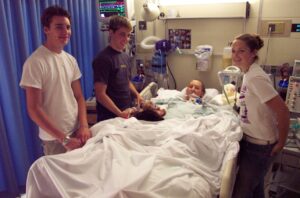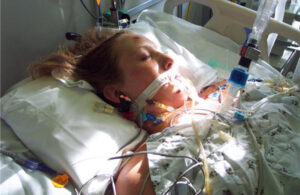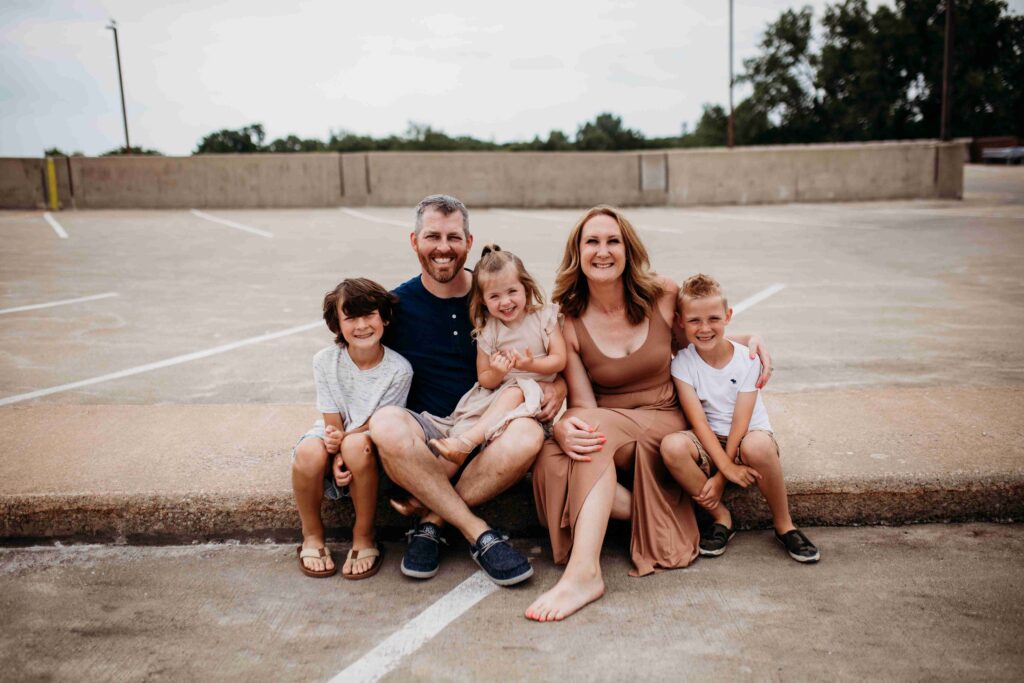Tansy Lederhaus Shares Her Story of Hope and Recovery at ThedaCare
Tansy Lederhaus is a registered nurse beloved for her empathy as much as for her medical expertise. That empathy is rooted in her past experience as a trauma patient at ThedaCare.
Her road from patient to medical caregiver began on June 12, 2002. Lederhaus and her best friend, Sarah, finished a six-hour shift at the local A&W Restaurant and were thrilled to be heading down the highway to Green Bay. That’s where they planned to pick up Lederhaus’s new car.
Things quickly took a tragic turn.
“We were on our way,” Lederhaus said. “I believe we made it about six minutes out of town on the state highway when we got into a car crash.”
The duo crashed into the back of a semi. Sarah didn’t survive. Lederhaus, 17 at the time, clung to life. Her injuries required her to be taken by ThedaStar to ThedaCare Regional Medical Center-Neenah.
Once she arrived at the hospital, Lederhaus was quickly evaluated. Imaging revealed she suffered two fractured femurs (thigh bones), a ruptured spleen and a grade five liver laceration (a severe, life-threatening injury involving extensive damage to the liver). Her liver bled profusely, posing a serious challenge for doctors.
“It required repeat treatments to try to get it to stop bleeding,” Lederhaus said. “I required more than 100 units of blood products in order to survive.”

Tansy Lederhaus recovers in a hospital bed after a fatal car crash in 2002.
A Challenging Situation
Things looked grim.
“My trauma surgeons initially gave me less than a 1% chance of surviving,” Lederhaus said. “That’s based on all the bleeding. It didn’t look good at first.”

Tansy Lederhaus lies in a hospital bed in 2002. She survived a fatal car crash that claimed the life of her best friend.
She would remain in the hospital for 43 days, including nine days in an induced coma.
Lederhaus doesn’t recall details about the crash. Thankfully, her father kept a journal and took photos documenting the experience. That, coupled with subsequent conversations with her medical team and the EMT and paramedic crews that aided her, helped Lederhaus paint a mental portrait of the tragic event.
“I don’t remember anything. Even the days leading up to the crash, I don’t remember,” she said. “My friends have kind of filled me in over the years. My dad and my mom filled me in. And then the EMTs and paramedics and health care workers all were able to kind of fill in the blanks for me. So, I don’t remember the crash at all but based on what I was told, I was able to kind of piece things together.”
Thanks to those conversations, Lederhaus now knows that medical experts like Dr. Raymond Georgen and Dr. Kevin Wasco, worked diligently to save her life. Dr. Georgen is the ThedaCare System Trauma Medical Director. He and Dr. Wasco, a general surgeon, were part of the surgical team that worked to save Lederhaus.
“Her blood pressure was extremely low. Her abdomen was distended and she had several orthopedic injuries,” Dr. Georgen said. “When we opened her abdomen, we knew we were facing a serious challenge. There was trauma to her liver, she was unstable, she was acidotic – her blood wasn’t clotting. What we ended up doing was what’s called damage control surgery to stabilize her.”
Stabilizing Lederhaus eventually included dialysis treatments, renal replacement therapy and managing her unstable blood pressure levels.
“Eventually, I started rallying and improving,” she said. “Things just got better, kind of miraculously.”
Blood Donations Were Vital
Lederhaus’s blood loss posed a serious hurdle for the medical team, Dr. Wasco said.
“We tried several techniques to get the bleeding to stop,” he said. “We even packed her abdomen with old fashioned gauze to stem the bleeding. At one point, we thought, ‘there’s no way we were going to get through this if we can’t stop the bleeding.’ Sure enough, almost magically, the bleeding stopped. That’s when we thought she could do it, she had a chance. We thought, ‘we’re going to win this. We’re going to win this with her.’”
Donated blood supplies were a crucial part of Lederhaus’s survival, Dr. Georgen said.
“Tansy lost a tremendous amount of blood,” he explained. “If we did not have the Community Blood Center and their donated blood supplies, she wouldn’t be here today. By the grace of God, she stopped bleeding. She still had a number of other injuries which we had to take care of over a very long period of time but the worst was over.”
The experience of treating Lederhaus left an impression on Dr. Wasco that has lasted two decades.
“It was white knuckle with her for a while,” he said. “In terms of how badly she was hurt, how much bleeding she had, how much she had to go through, she’s definitely one of the top five trauma cases that we’ve had.”
Processing the Aftermath of the Crash
Lederhaus would eventually wake from her coma.
“I remember waking up and I remember seeing my dad,” she said. “He was the first person I saw when I woke up, or at least the first I remember seeing.”
She couldn’t speak because she was on a ventilator. She communicated with her parents by writing on a whiteboard.
“I think it was like two or three solid days of being awake before I finally asked what had happened,” Lederhaus said. “I don’t know why I wouldn’t have thought sooner to ask what had happened but I know I was heavily medicated and everything.”
Her parents shared what they knew.
“I asked where I was and they said I was in the hospital. I asked why? My dad said, ‘you were in a car crash,’” Lederhaus said. “I asked if the car was OK? My dad said, ‘no, the car is not okay.’ Then I must have asked, who was I with? He said I was with Sarah. I asked if she was okay, and he said, ‘no, Sarah died in the accident.’ Then it was just processing that as a 17 year old, healing from that and from all my physical and emotional and mental trauma.”
She was able to do that with help from family and friends, Dr. Georgen observed.
“One of the big things I remember about Tansy was the family support she had,” he said. “Her mom and dad were ever present. Her mom was a nurse. Her dad recorded pretty much everything that happened so he could kind of reflect on things and share with others. She had tremendous support from her family and we really felt like it was a team, working with her mom and dad, through those hard times.”
Importance of a Local Trauma Center
Lederhaus’s car crash experience highlights the value of a local trauma center, Dr. Georgen said. ThedaCare Regional Medical Center-Neenah is one of nine adult Level II trauma centers in Wisconsin. ThedaCare has maintained its Level II Trauma Center verification since 1998.
“Tansy’s injuries were suffered back in the early 2000s,” Dr. Georgen said. “I had just finished writing the state trauma plan at the time so people would be taken to appropriate facilities when certain injuries are recognized in the field. Before that, you went where you were taken. So, it’s inspiring for me to see the changes over the last 25 years or so and to see tangible results like we’ve seen with Tansy’s experience.”
Dr. Wasco agreed.
“When Tansy came to us, she was the first real-time example to show us how this program needed to run,” he said. “She was brought to our facility and we were prepared. She had everything she needed here, at ThedaCare. That was an example of the effectiveness of Dr. Georgen’s leadership as he created the state trauma plan.”
Reflecting Years Later
Two decades after the crash, Lederhaus is married, has three children and is a registered nurse.
“Life is great. I went on and I got a nursing degree. I decided to pursue a career in nursing after my experience. I’ve worked as a nurse now for the better part of 16 years,” she said. “I married my high school sweetheart who was there with me throughout the car crash experience. I didn’t know if I’d be able to have kids based on all the injuries and all the unknowns but I was able to and I’ve got three kids. Life is good.”

Tansy Lederhaus survived a 2002 car crash that claimed the life of her best friend. She has since gone from a trauma patient at ThedaCare to a registered nurse caring for others. The mother of three offers patients the empathy she received during her 43-day stay at ThedaCare.
Lederhaus has set a personal blood donation goal, a reminder of the support she received from the Community Blood Center.
“I host blood drives at my work through either the Red Cross or the Community Blood Center,” she said. “I plan them, recruit for them and then help with them. My goal is to donate 100 units to give back what I received.”
She’s also authored a book about her car crash experience. It’s called 43 Days. She’s planning to have it published by the end of 2025.
“I did it to honor Sarah, who died in the crash and I did it to honor the people who saved my life,” Lederhaus said. “I also did it to help advocate for blood donation.”
While she has made much of her second lease on life, she never will forget that it almost wasn’t to be.
“The crash and losing Sarah still impacts me,” she said. “The physical scars are reminders but so are the emotional ones. It’s part of who I am. It deepened my empathy and gave me a sense of responsibility to use my survival story for something bigger than myself.”
She also will never forget all the people – emergency first responders, surgeons, medical team members, family, friends and well-wishers – who worked together to help save her life and aid her long-term recovery.
“They mean the world to me. They hold such a special place in my heart,” she said. “They helped me get through this. They were my voice when I didn’t have one. They were my strength.”
Click here for an in-depth look at Tansy Lederhaus’s story.
About ThedaCare
For more than 115 years, ThedaCare® has been improving the health and well-being of the communities it serves in Northeast and Central Wisconsin. The organization delivers care to more than 650,000 residents in 17 counties, and employs approximately 7,000 providers and team members at 180 points of care, including nine hospitals. As an organization committed to being a leader in Population Health, team members are dedicated to empowering people to live their unique, best lives. ThedaCare is a not-for-profit health system with a level II trauma center, comprehensive cancer treatment, stroke and cardiac programs, as well as primary care. ThedaCare also partners with communities to understand needs, find solutions together, and encourage health awareness and action. In 2024, ThedaCare and Froedtert Health combined to form one system to strengthen local health care and provide high-quality services for treatment and prevention in a coordinated manner.
